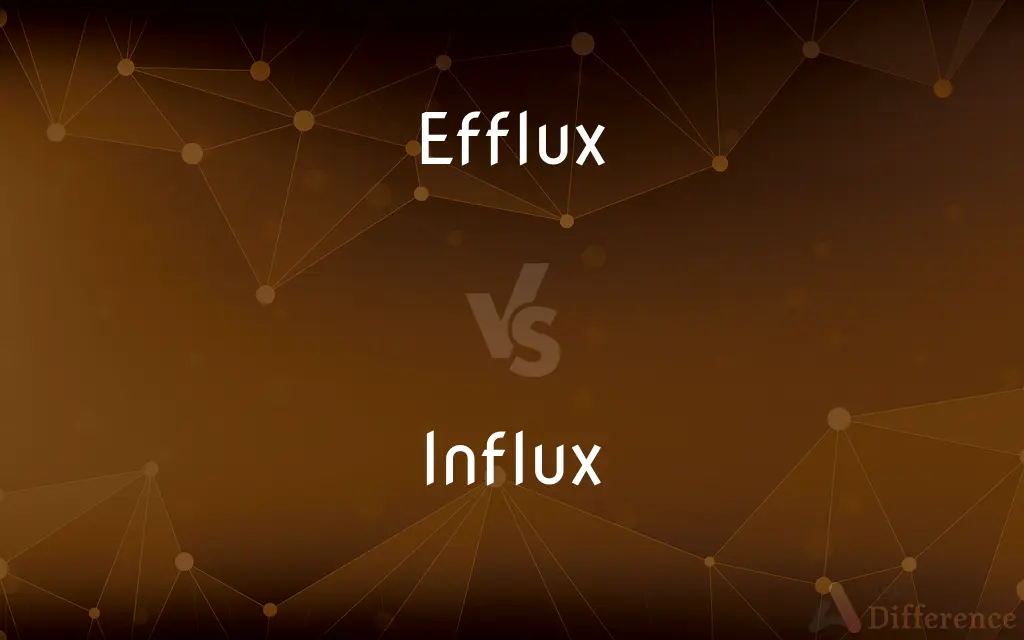Efflux vs. Influx — What's the Difference?
By Maham Liaqat & Urooj Arif — Updated on March 11, 2024
Efflux refers to the outward flow or movement of something from a container or region, while influx denotes the inward flow or arrival of something into a particular area or system.

Difference Between Efflux and Influx
Table of Contents
ADVERTISEMENT
Key Differences
Efflux is the process or action of flowing out, often used to describe liquids, gases, or even people moving out of a particular area, container, or system. This term is frequently applied in contexts such as environmental science, biology, and engineering, where it signifies the movement of substances or entities away from a specific location. On the other hand, influx refers to the movement or flow into a place or system, commonly used to describe the arrival of substances, organisms, or individuals into a new area, suggesting a surge or increase in quantity or concentration within that area.
In environmental contexts, efflux might describe the release of pollutants or water from a specific ecosystem, indicating a decrease or outflow from that system. Conversely, an influx in the same context could refer to the introduction of nutrients, water, or species into an ecosystem, potentially leading to growth or increased diversity within that system.
In demographics or migration studies, efflux can denote the departure or emigration of people from a city, region, or country, often leading to concerns about brain drain or decreased population density. In contrast, influx is used to describe immigration or the arrival of new residents, which can contribute to population growth, cultural diversity, and economic development.
Economically, efflux might be used to discuss the outflow of capital or resources from a market or country, possibly indicating a lack of confidence or a response to unfavorable conditions. Influx, in this context, would suggest investment or the introduction of new capital and resources, often seen as a positive indicator of economic health and growth potential.
Efflux and influx also play significant roles in biological systems, particularly in the context of cellular processes. Efflux can describe the movement of ions or molecules out of a cell, which is crucial for maintaining cellular homeostasis and function. In contrast, influx refers to the entry of substances into a cell, essential for nutrient uptake, signaling, and energy production.
ADVERTISEMENT
Comparison Chart
Definition
Movement out of an area or system.
Movement into an area or system.
Contexts
Environmental science, biology, engineering.
Demographics, ecology, economics.
Implications
Often indicates a decrease or outflow.
Suggests an increase or surge in quantity.
Examples
Release of pollutants, emigration of people.
Introduction of nutrients, immigration.
Biological Relevance
Outflow of ions or molecules from cells.
Entry of substances into cells.
Compare with Definitions
Efflux
The outward flow of a substance from a container or area.
The efflux of water from the damaged dam threatened the nearby villages.
Influx
The arrival or inward flow of a substance into a space.
The influx of fresh water into the lake helped restore its ecosystem.
Efflux
The release or outflow of chemicals or pollutants.
The factory's efflux of waste into the river posed serious environmental risks.
Influx
Entry of molecules or ions into a cell.
Calcium ion influx plays a critical role in muscle contraction.
Efflux
Movement of people out of a specific region.
The rural areas experienced an efflux of young people moving to urban centers for better opportunities.
Influx
Movement of individuals into a new area.
The city saw a significant influx of tourists during the festival season.
Efflux
Describes the outflow of resources or capital.
The political instability led to an efflux of investment from the country.
Influx
Surge of investment or capital into a market.
The tech sector experienced an influx of venture capital funding.
Efflux
The process of substances exiting a biological cell.
The efflux of sodium ions is essential for nerve cell function.
Influx
Introduction of nutrients or resources into a system.
The agricultural field benefited from the influx of organic matter.
Efflux
A flowing outward.
Influx
A flowing in
An influx of foreign capital.
Efflux
Something that flows out or forth; an effluence.
Influx
A mass arrival or incoming
An influx of visitors to the city.
Large influxes of refugees.
Efflux
A passing or an expiration, as of time.
Influx
A flow inward or into something; a coming in.
I'll buy a new computer when I get an influx of cash.
Efflux
The process of flowing out.
We all age through the efflux of time.
The efflux of matter from a boil can be painful.
Influx
That which flows or comes in.
Efflux
That which has flowed out.
The efflux of a boil
Influx
(obsolete) influence; power.
Efflux
(intransitive) To run out; to flow forth.
Influx
The act of flowing in; as, an influx of light.
Efflux
To pass away.
Influx
A coming in; infusion; intromission; introduction; importation in abundance; also, that which flows or comes in; as, a great influx of goods into a country, or an influx of gold and silver.
The influx of food into the Celtic region, however, was far from keeping pace with the influx of consumers.
The general influx of Greek into modern languages.
Efflux
The act or process of flowing out, or issuing forth; effusion; outflow; as, the efflux of matter from an ulcer; the efflux of men's piety.
It is then that the devout affections . . . are incessantly in efflux.
Influx
Influence; power.
Efflux
That which flows out; emanation; effluence.
Prime cheerer, light! . . . Efflux divine.
Influx
The process of flowing in
Efflux
To run out; to flow forth; to pass away.
Efflux
The process of flowing out
Common Curiosities
How do economies respond to capital efflux?
Economies may respond to capital efflux by implementing policies to retain investment or attract new capital to counteract the outflow.
How do efflux and influx affect ecosystems?
Efflux and influx can significantly impact ecosystems by altering nutrient levels, species populations, and habitat conditions.
What causes efflux in a biological cell?
Efflux in cells is often caused by active transport mechanisms that move substances out of the cell to maintain homeostasis.
Are efflux and influx always natural processes?
Efflux and influx can be natural or result from human activities, such as pollution release or controlled water flow.
Can technological advances influence efflux and influx?
Yes, technological advancements can impact efflux and influx, such as improving water treatment or enhancing migration tracking systems.
How do global events affect efflux and influx trends?
Global events, like pandemics or economic crises, can significantly alter efflux and influx patterns, impacting migration and investment flows.
How does efflux affect pharmaceutical drug design?
Drug design must consider efflux mechanisms to ensure therapeutic compounds remain effective within target cells.
What strategies can mitigate negative efflux effects?
Strategies may include pollution control, habitat restoration, and economic policies to stabilize and attract resources.
How do efflux pumps contribute to antibiotic resistance?
Efflux pumps in bacteria can expel antibiotics, contributing to resistance by decreasing the drug's intracellular concentration.
Can an influx lead to negative outcomes?
While influx often indicates growth, excessive influx, like overcrowding or resource depletion, can lead to negative consequences.
How is efflux measured in environmental studies?
Efflux in environmental studies can be measured using various techniques, including tracer studies and flow monitoring.
What are the consequences of unregulated efflux of industrial waste?
Unregulated efflux of waste can lead to environmental pollution, health hazards, and loss of biodiversity.
What role does influx play in urban development?
Influx, especially of people and investment, is crucial for urban growth, infrastructure development, and cultural vibrancy.
Can cultural factors influence patterns of human efflux and influx?
Cultural factors, such as social norms and values, can greatly influence migration patterns, affecting both efflux and influx in regions.
Can efflux and influx be controlled in managed ecosystems?
In managed ecosystems, efforts can be made to control efflux and influx to maintain balance, such as water management in wetlands.
Share Your Discovery

Previous Comparison
Heathen vs. Pagan
Next Comparison
Hence vs. ThusAuthor Spotlight
Written by
Maham LiaqatCo-written by
Urooj ArifUrooj is a skilled content writer at Ask Difference, known for her exceptional ability to simplify complex topics into engaging and informative content. With a passion for research and a flair for clear, concise writing, she consistently delivers articles that resonate with our diverse audience.













































